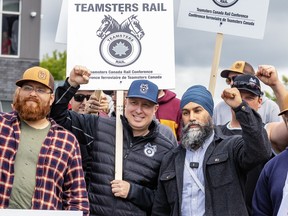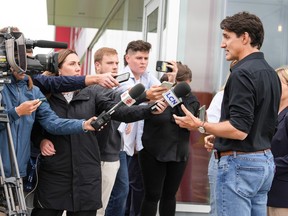The ongoing work conflict with Canada’s two biggest railways could prove difficult for federal parties who are courting union workers’ votes

Article content
OTTAWA — The ongoing work conflict with Canada’s two biggest railways could prove to be a political headache for federal parties who are courting union workers’ votes.
On Thursday, less than 17 hours after Canadian Pacific Kansas City (CPKC) and Canadian National Railway (CN) locked out workers, Labour Minister Steven MacKinnon said that he would direct the Canada Industrial Relations Board to impose final binding arbitration.
Advertisement 2
Article content
MacKinnon said that while his government “has done a lot for the labour movement and is committed totally to collective bargaining,” he said the talks between the railways and their workers were at an “impasse” and their effects were felt by all Canadians.
The news prompted a scathing reaction from NDP Leader Jagmeet Singh, whose party has been propping up at the government as part of their supply-and-confidence agreement.
Recommended from Editorial
“Justin Trudeau has just sent a message to CN, CPKC and all big corporations — being a bad boss pays off,” he said. “The Liberals’ actions are cowardly, anti-worker and proof that they will always cave to corporate greed, and Canadians will always pay for it.”
“There will be no end to lockouts now. Every employer knows they can get exactly what they want from Justin Trudeau by refusing to negotiate with their workers in good faith. And that puts the safety of workers and communities at risk,” he added.
Article content
Advertisement 3
Article content
The Conservatives, on the other hand, have remained notably silent on the issue.
Despite the rail stoppage being the most pressing economic issue of the moment, requests for comment to Conservative Leader Pierre Poilievre and labour critic Kyle Seeback about the ongoing conflict have remained unanswered in the past two days.
Meanwhile, Poilievre has tweeted a video about unleashing the power of natural resources, another one about “drug dens,” shared a petition to axe the carbon tax and issued a statement about Black Ribbon Day for victims of communism and Nazism in Europe.
Former Conservative minister James Moore told CBC News that Poilievre has been around the cabinet table in work conflicts before and would know that there might be lots of things happening behind the scenes. He said that negotiating in public “is probably not helpful.”
“As the Opposition leader, you don’t swing at every pitch,” said Moore.
Carlene Variyan, associate vice-president at Summa Strategies, spent three years as an adviser to the Labour Minister for the Liberal government. She said in an interview that it is “very odd” that the Conservatives have not yet weighed in on the rail conflict.
Advertisement 4
Article content
“They certainly have before when it’s come to labour issues like this. And so, it is notable that they are silent on this one,” she said.

The Conservatives have been pushing to build relationships with the labour movement and recently nominated Colin Reynolds, an electrician who calls himself a proud union member, as their candidate in an upcoming byelection in a Winnipeg riding.
“That byelection in Elmwood—Transcona, I have to think, is a part of that because that’s a big rail town,” said Variyan about the party’s silence on the rail work conflict.
The situation has moved very fast. On Friday, the Teamsters union served CN with a 72-hour strike notice which would start on Monday. As for CPKC, the union said the work stoppage remains ongoing pending an order from the Canada Industrial Relations Board.
In a statement, CN accused the union workers of “shutting down the economy, impacting people and jobs across the country” and urged the board to rule quickly on the matter. Business groups also stressed the damage to the economy across the country.
Cam Holmstrom, founder and principal at Niipaawi Strategies and an NDP strategist, said that there may be risks for any opposition party to get in the way of a solution.
Advertisement 5
Article content
“Honestly, I think the best thing that these guys can do at this point, for the Conservatives and for the NDP, is honestly to be constructive. Don’t finger point. Right now is not the time to assign blame without having some kind of way to help out,” he said.
Holmstrom said that while Canadians in major centres might be used to hearing news stories about First Nation communities being under boil-water advisories, they might feel differently if shipments of chlorine do not make it across the country.
“Do you want to be the one who’s explaining to people on in a campaign a year from now why you were not willing to bend to allow people to have clean drinking water in Toronto, Vancouver, Montreal and Edmonton?” he asked.
“To me, that’s why … I think there’s a lot of danger for everyone in this.”
The Canada Industrial Relations Board is poised to come to a decision in a matter of days, but once this conflict is over, MacKinnon said that the federal government will be examining why the railway sector is experiencing repeated work conflicts.
Variyan warned that binding arbitration will almost certainly not permanently resolve some of the long-standing issues in the railway sector, and that it might find itself in the same situation a few years from now — possibly under a Conservative government.
“There’s an issue of buy now, pay later,” she said. “When you force an agreement to come together between two parties who are so far apart, you are kicking the can down the road so that three or four years from now, we’re probably back here again.”
National Post
calevesque@postmedia.com
Our website is the place for the latest breaking news, exclusive scoops, longreads and provocative commentary. Please bookmark nationalpost.com and sign up for our politics newsletter, First Reading, here.
Article content







